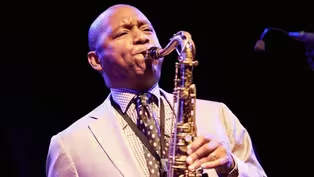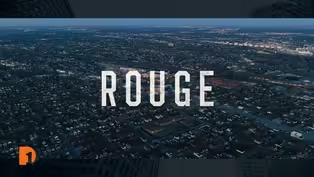
Freep Film Festival spotlights local documentary filmmakers
Clip: Season 8 Episode 40 | 8m 12sVideo has Closed Captions
The 2024 Freep Film Festival spotlights local documentaries and filmmakers.
Cinephiles and documentary enthusiasts are getting ready for the start of the 2024 Freep Film Festival April 10-14. One Detroit contributor Stephen Henderson, host of “American Black Journal,” talks with the festival’s Artistic Director and Co-Founder, Kathy Kieliszewski, and local filmmaker Razi Jafri, about what attendees can expect this year.
Problems playing video? | Closed Captioning Feedback
Problems playing video? | Closed Captioning Feedback
One Detroit is a local public television program presented by Detroit PBS

Freep Film Festival spotlights local documentary filmmakers
Clip: Season 8 Episode 40 | 8m 12sVideo has Closed Captions
Cinephiles and documentary enthusiasts are getting ready for the start of the 2024 Freep Film Festival April 10-14. One Detroit contributor Stephen Henderson, host of “American Black Journal,” talks with the festival’s Artistic Director and Co-Founder, Kathy Kieliszewski, and local filmmaker Razi Jafri, about what attendees can expect this year.
Problems playing video? | Closed Captioning Feedback
How to Watch One Detroit
One Detroit is available to stream on pbs.org and the free PBS App, available on iPhone, Apple TV, Android TV, Android smartphones, Amazon Fire TV, Amazon Fire Tablet, Roku, Samsung Smart TV, and Vizio.
Providing Support for PBS.org
Learn Moreabout PBS online sponsorship(upbeat ambient music) So let's talk about the Freep Film festival.
What should I go see this year?
- We're in our 11th year, right?
- Yeah.
- And you know, our theme has always been Michigan films or films that are relevant and resonate here in Michigan.
And every year I am surprised that there are that many important stories that are well produced that are worthy of a big screen like here at the Detroit Film Theater.
- Yeah.
- And so, you know, this year most of the films in the main lineup have some sort of Michigan connection, be it Opening Night with "Rouge", which is about the River Rouge High School basketball team, a film called "Relentless" that looks at the efforts by University of Michigan scientists back in the day to save the Great Lakes fishery, and particularly from the Sea Lamprey.
- Yeah.
- We've got one about the resurrection of the Detroit Riverfront.
So there's.
- I'm a little familiar with that.
- You're a little familiar (Stephen laughing) with that one.
So, yes, produced by DPTV.
- Yeah.
- And then, you know, things that have strong dotted lines back here, like the never too much, the Luther Vandross.
We know Luther has to come to Freep because we know he's got a strong fan base here.
- Yeah, yeah.
What about themes this year?
What are we looking at?
- Yeah, I'm really excited to partner with the Freep again this year to curate an Asian American set of films.
- Yeah.
- Looking at a spectrum of Asian American experiences from Asian American directors.
It's a second year we've done this program, and so we have some really amazing films, you know, both biographical, looking at the contributions in sports and art with Jeanette Lee verse as a ESPN documentary directed by Ursula Lang.
We also have the Nam June Paik boipic directed by Amanda Kim.
We also have an incredible short films program with the theme around labor.
- Uh-huh.
- Both labor that we perform in our work and vocations, but also the work that we do in our families to kind of keep things together.
- Yeah.
- So those are some of the films and some of the themes that we're looking at in the AAPI film series.
- Yeah.
And talk about why that part of the festival is important, that Asian American Pacific Islander kind of subgroup really.
- Yeah, it's incredibly important.
You know, we are very lucky in southeast Michigan.
- Yeah.
- We have a robust Asian American community.
- Growing one.
- And growing.
- Yeah.
- Yeah.
- Yeah.
- Particularly, you know, in places like Canton and Troy and of course Hamtramck, you know, as well.
And I've myself, you know, being of Indian heritage, I've seen the community evolve and grow and become more dynamic and become more engaged in the political process and make contributions across different sectors.
And I think we wanna be able to reflect that on screen as well, and we want people to be able to see themselves and in the stories that we're trying to bring here to Detroit.
And we also wanna try to develop and grow the filmmaking community and to bring together Asian American filmmakers.
And we're very lucky through a generous support from the Ford Foundation, we're able to actually bring all the directors to Michigan and have connections with them and have them participate in the Q&As.
Not all of them can make it, so we will figure out other ways to incorporate the other filmmakers too.
- Yeah.
- But it's an incredible program and I'm glad that we're able to do it again for a second year.
- Yeah.
So I can remember of course, when this all started.
- Yeah.
- It was different in the first couple of years, and I feel like it was harder maybe to fill out the roster with locally produced films.
- Mm-hmm.
- And now, I mean, people are beating down your door it seems to get into the festival.
(Stephen laughing) - Sometimes.
- Yeah.
- Sometimes.
- So what's changed over that time in terms of filmmaking here, the filmmaking community here?
Do you feel like the festival has had an influence over how much is done?
How kind of big or robust the community is?
- I mean, I'd like to think that we have helped embolden the ecosystem to make films.
We've done a lot to bring filmmakers that were maybe previously from the region and have gone onto the coast to bring them back, to connect with local filmmakers, to continue to not only highlight that there's filmmaking being done here, but there is talent here that could be utilized for other projects.
We know the parachuting of journalists was a thing back, particularly during kinda the 2008 and the bankruptcy period.
And the similar thing with filmmakers kind of coming in and telling stories about us.
- About us, yeah.
- And so the thought was, no, we wanna be the authors of our own stories, but the visibility, the connections, I mean, getting funding and distribution, all of those things are really kind of targeted towards the filmmakers that are more visible on the coast.
- Yeah.
- And I think we've done a good job of saying, "No, there's great talent and filmmaking happening here."
And you'll see that, I mean, particularly we've got outside the AAPI series, we have three really amazing Schwartz programs that are chockfull of local filmmakers.
- Yeah.
- I do think that the festival has given a platform and has also provided support and networking opportunities that have allowed for more filmmaking to continue to happen.
And I do think from a festival of visibilities, I mean, 11 years is a long time in a festival.
- Yeah.
- Lifespan.
- And when we've had films like we have "Frida", the documentary about Frida (indistinct).
- Was gonna ask you about that.
It's one of my favorite films.
- It's so beautiful and so well done, that maybe in year one or two, I would never have gotten that film.
- Is that right?
- Yes.
That Amazon would have said, you know, "I'm not really sure that's worth us."
- Really?
- "Playing this small regional festival."
And obviously its connection here to this amazing institution and this museum.
- Yeah.
- And where.
- I mean, and that's gonna play here at the DFT.
- Yes.
- Which is attached to the museum.
- Right, and there'll be some tours, some free tours happening of the industry murals just prior to the screening to kinda tie it all together.
But that her time here in Detroit is really a part of that story.
And much of it is, well, all of it is really done in the voices of the people through their letters and diaries.
And it's such a personal look at her life and her experiences, in her artist's life, her life with Diego and her life both in Mexico and here in the States.
- Yeah, yeah.
So my favorite moment in the festival was the premiere of course, 12th and Claremont, which you worked on.
- Yes.
- And lots of people at the Freep Press.
Talk about other premieres that you've sort of clung to and thought were really great.
- That was pretty magical.
- Yeah.
- You know, the community's response to that film.
We've had some amazing premieres.
I mean, you know, the Russian five, the story of Cream Magazine, you know, last year's "Cold Water Kitchen", which is another Free Press film.
- Uh-huh.
- You know, it's really hard to fill an 1100 seat theater on a Wednesday night (Stephen laughing) for a documentary.
- Right.
And Freep Press, I think it's, you know, we've picked films that we think really resonate with audiences.
I mean, Rouge is selling really well, but, so please, if you haven't (everyone laughing) gotten your tickets yet, - It's like, go get 'em.
- Please go get your tickets.
We've been really fortunate that there's been so many films that are of really high quality, that are great Michigan stories.
- Yeah, yeah.
One Detroit Weekend: April 5, 2024
Video has Closed Captions
Clip: S8 Ep40 | 1m 58s | Celebrate Jazz Appreciation Month and support small businesses this weekend in Detroit. (1m 58s)
River Rouge High School featured in new local documentary
Video has Closed Captions
Clip: S8 Ep40 | 8m 32s | A local documentary about River Rouge High School is featured at the Freep Film Festival. (8m 32s)
Providing Support for PBS.org
Learn Moreabout PBS online sponsorship
- News and Public Affairs

Top journalists deliver compelling original analysis of the hour's headlines.

- News and Public Affairs

FRONTLINE is investigative journalism that questions, explains and changes our world.












Support for PBS provided by:
One Detroit is a local public television program presented by Detroit PBS

